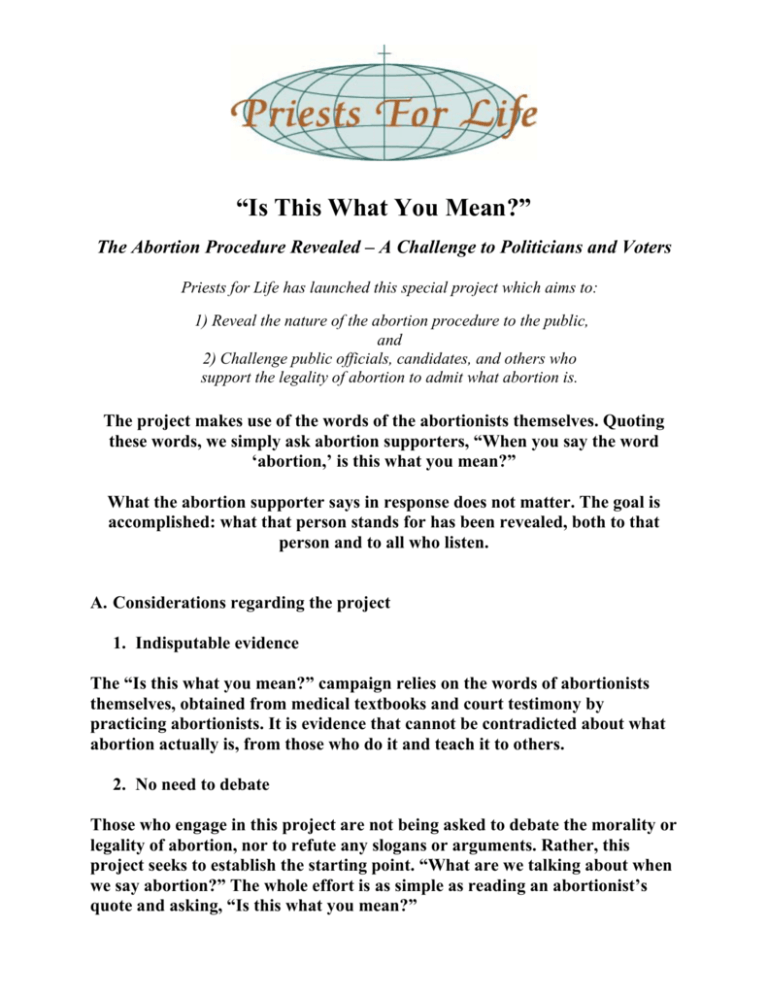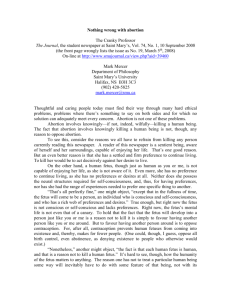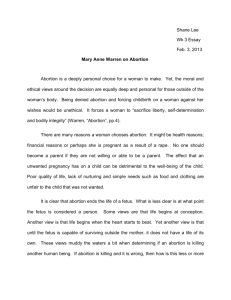Is This What You Mean?
advertisement

“Is This What You Mean?” The Abortion Procedure Revealed – A Challenge to Politicians and Voters Priests for Life has launched this special project which aims to: 1) Reveal the nature of the abortion procedure to the public, and 2) Challenge public officials, candidates, and others who support the legality of abortion to admit what abortion is. The project makes use of the words of the abortionists themselves. Quoting these words, we simply ask abortion supporters, “When you say the word ‘abortion,’ is this what you mean?” What the abortion supporter says in response does not matter. The goal is accomplished: what that person stands for has been revealed, both to that person and to all who listen. A. Considerations regarding the project 1. Indisputable evidence The “Is this what you mean?” campaign relies on the words of abortionists themselves, obtained from medical textbooks and court testimony by practicing abortionists. It is evidence that cannot be contradicted about what abortion actually is, from those who do it and teach it to others. 2. No need to debate Those who engage in this project are not being asked to debate the morality or legality of abortion, nor to refute any slogans or arguments. Rather, this project seeks to establish the starting point. “What are we talking about when we say abortion?” The whole effort is as simple as reading an abortionist’s quote and asking, “Is this what you mean?” 3. Educating the listener When the abortion supporter is presented with the abortionist’s quotes and asked, “Is this what you mean?”, the goal of the project has already been accomplished, namely, that the abortion supporter – and others who are listening – have heard a description of abortion that they have never heard before. They have heard graphic detail that cuts through the rhetoric and restores meaning to the word “abortion.” 4. The dilemma for politicians Politicians who support abortion don’t want people to hear the descriptions of it. When challenged with the quotes of abortionists and asked, “Is this what you mean?”, they face a dilemma: either they admit that what they support is horrifying, or they demonstrate, by their evasion, that they cannot even admit what they support. Either way, it doesn’t look good for abortion and it doesn’t look good for them. B. Where do I ask the question? The ideal forum for this project is at a town hall meeting with a pro-abortion politician. The quotes can be shared, and the question “Is this what you mean?” asked in other circumstances as well, such as in private meetings, in classrooms, on television or radio programs, in letters to the editor, or on blogs and other internet forums. C. Source materials Scroll down on this document for various quotes you can use from the abortion industry. More will be posted regularly at www.priestsforlife.org/isthiswhatyoumean/index.htm. Along with quotes, you can challenge abortion supporters with the question, “Is this what you mean?” by showing them diagrams about the procedure, and by showing them videos that describe the procedure. • Order professionally created diagrams of the Suction procedure and the D&E procedure at www.priestsforlife.org/store/c-14-fliers.aspx • Order The Procedure DVD. See www.priestsforlife.org/store/c-32-dvdvideo.aspx • See the abortion procedure videos we have placed on YouTube at www.youtube.com/frfrankpavone and, in Spanish at www.youtube.com/contraelaborto D. During Election Season This project is perfect for any election cycle. It energizes pro-life people, because it gets to the very foundation of their concern. It bypasses the rhetoric and arguments by which people can be led to think that there is another issue equivalent to abortion. In fact, there is not, and the descriptions demonstrate that. Moreover, as a way of challenging candidates and educating voters, this project is completely non-partisan, and can be used at every level of government. Whether someone is running for local school board or for President of the United States, he or she can be challenged with the question, “Is this what you mean?” E. After the Elections The project can be used all year round, to challenge abortion supporters who hold public office, and to challenge other abortion supporters in our society or among our families, friends, and co-workers. F. Challenging Congress – Another aspect of this project is that at a specified time in the near future, the Pastoral Team of Priests for Life will go together to visit the offices of the proabortion members of Congress, and will bring the quotes and diagrams of the abortion procedures and ask them, “Is this what you mean?” When we do this, we want to bring with us the names of thousands of their constituents, so that we can say, “These people are also asking, ‘Is this what you mean?’” To sign up to let us include your name, visit www.priestsforlife.org/askwashington/index.aspx. To summarize… To pro-abortion politicians and other abortion supporters, this campaign says: • If you’re going to take a position on abortion, then you’re going to have to come clean about what it is. We are no longer going to let you obscure or trivialize the issue. Whether people agree with you or not, you owe it to them to be honest about what you’re talking about. • Therefore we issue this simple call to honesty: We will describe abortion to you, and you tell us if that’s what you’re talking about. That’s it, pure and simple. This is not a debate, nor a threat. It’s a call to clarity, a demand for honesty. That is not partisan, nor is it unreasonable; it is not fanatical or inappropriate in any way. Nor is this about religion or morality. We just want to make sure that we’re hearing you. When you say “abortion,” we just want to make sure we’re both talking about the same thing. Quotes Short version First Trimester Suction Abortion “Question: Can the heart of a fetus or embryo still be beating during a suction curettage abortion as the fetus or embryo comes down the cannula? Answer: For a few seconds to a minute, yes.” (Sworn testimony given in US District Court for the Western District of Wisconsin (Madison, WI, May 27, 1999, Case No. 98-C-0305-S), by Dr. Harlan Raymond Giles, an abortionist. He describes legal activity.) *** “The fetus passes through the catheter and either dies in transit as it’s passing through the catheter or dies in the suction bottle after it’s actually all the way out.” (Sworn testimony given in US District Court for the Western District of Wisconsin (Madison, WI, May 27, 1999, Case No. 98-C-0305-S), by Dr. Martin Haskell, an abortionist. He describes legal activity.) Second Trimester D&E Abortion “A long curved Mayo scissors may be necessary to decapitate and dismember the fetus…" (From the medical textbook Abortion Practice – Dr. Warren Hern, p.154, describing legal activity). *** “The friction causes the fetus to tear apart. For example, a leg might be ripped off the fetus as it is pulled through the cervix.” (US Supreme Court, Gonzales vs. Carhart, April 18, 2007, describing the D&E procedure, which is legal). *** “We would attack the lower part of the lower extremity first, remove, you know, possibly a foot, then the lower leg at the knee and then finally we get to the hip." (Sworn testimony given in US District Court for the Western District of Wisconsin (Madison, WI, May 27, 1999, Case No. 98-C-0305-S), by Dr. Martin Haskell, an abortionist. He describes legal activity.) *** “Typically the skull is brought out in fragments rather than as a unified piece…" (Sworn testimony given in US District Court for the Western District of Wisconsin (Madison, WI, May 27, 1999, Case No. 98-C-0305-S), by Dr. Martin Haskell, an abortionist. He describes legal activity.) Longer version First Trimester Suction Abortion "The physician will usually first notice a quantity of amniotic fluid, followed by placenta and fetal parts, which may be more or less identifiable." (From the medical textbook Abortion Practice – Dr. Warren Hern, p.114, in section on First Trimester Abortion). *** “When we do a suction curettage abortion, you know, roughly one of three things is going to happen during the abortion. One would be that the catheter as it approaches the fetus, you know, tears it and kills it at that instant inside the uterus. The second would be that the fetus is small enough and the catheter is large enough that the fetus passes through the catheter and either dies in transit as it’s passing through the catheter or dies in the suction bottle after it’s actually all the way out.” (Sworn testimony given in US District Court for the Western District of Wisconsin (Madison, WI, May 27, 1999, Case No. 98-C-0305-S), by Dr. Martin Haskell, an abortionist. He describes legal activity.) *** “Question: Can the heart of a fetus or embryo still be beating during a suction curettage abortion as the fetus or embryo comes down the cannula? Answer: For a few seconds to a minute, yes.” (Sworn testimony given in US District Court for the Western District of Wisconsin (Madison, WI, May 27, 1999, Case No. 98-C-0305-S), by Dr. Harlan Raymond Giles, an abortionist. He describes legal activity.) Second Trimester D&E Abortion "The procedure changes significantly at 21 weeks because the fetal tissues become much more cohesive and difficult to dismember. This problem is accentuated by the fact that the fetal pelvis may be as much as 5cm in width. The calvaria [head] is no longer the principal problem; it can be collapsed. Other structures, such as the pelvis, present more difficulty….A long curved Mayo scissors may be necessary to decapitate and dismember the fetus…" (From the medical textbook Abortion Practice – Dr. Warren Hern, p.154) *** “The doctor grips a fetal part with the forceps and pulls it back through the cervix …, continuing to pull even after meeting resistance from the cervix. The friction causes the fetus to tear apart. For example, a leg might be ripped off the fetus as it is pulled through the cervix and out of the woman. The process of evacuating the fetus piece by piece continues until it has been completely removed.” (US Supreme Court, Gonzales vs. Carhart, April 18, 2007, describing the D&E procedure). *** "Let's just say for instance we took a different view, a different tact and we left the leg in the uterus just to dismember it. Well, we'd probably have to dismember it at several different levels because we don't have firm control over it, so we would attack the lower part of the lower extremity first, remove, you know, possibly a foot, then the lower leg at the knee and then finally we get to the hip." "And typically when the abortion procedure is started we typically know that the fetus is still alive because either we can feel it move as we're making our initial grasps or if we're using some ultrasound visualization when we actually see a heartbeat as we're starting the procedure. It's not unusual at the start of D&E procedures that a limb is acquired first and that that limb is brought through the cervix … prior to disarticulation and prior to anything having been done that would have caused the fetal demise up to that point." "When you're doing a dismemberment D&E, usually the last part to be removed is the skull itself and it's floating free inside the uterine cavity…So it's rather like a ping-pong ball floating around and the surgeon is using his forcep to reach up to try to grasp something that's freely floating around and is quite large relative to the forcep we're using. So typically there's several misdirections, misattempts to grasp. Finally at some point either the instruments are managed to be place around the skull or a nip is made out of some area of the skull that allows it to start to decompress. And then once that happens typically the skull is brought out in fragments rather than as a unified piece…" (Sworn testimony given in US District Court for the Western District of Wisconsin (Madison, WI, May 27, 1999, Case No. 98-C-0305-S), by Dr. Martin Haskell, an abortionist. He describes legal activity.) Contact Priests for Life at PO Box 141172, Staten Island, NY 10314 Tel. 718-980-4400; Fax 718-980-6515; Email: mail@priestsforlife.org; Website: www.priestsforlife.org




